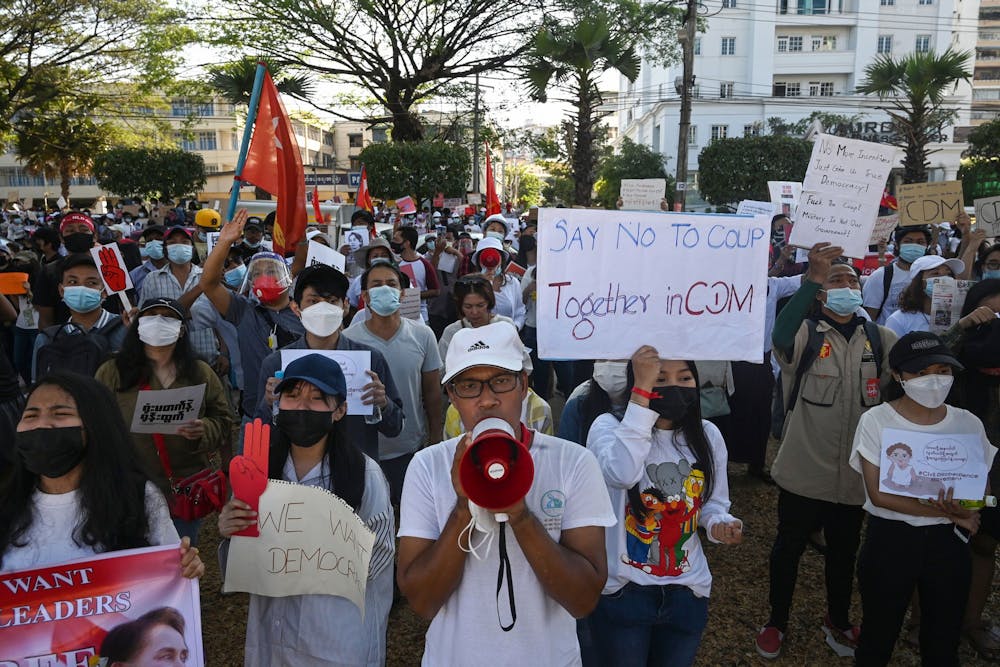Last weekend, more than 100 activists filled Monument Circle in downtown Indianapolis, protesting the recent overthrow of Myanmar’s democratic government by the Myanmar military. Indiana is home to one of the largest Burmese refugee populations in the United States, so a formal position against Myanmar's recent military rule is needed, whether through statements by Indiana legislatures or Indiana universities.
In the past, IU has addressed international issues concerning IU students. President Michael McRobbie issued a statement in 2017 condemning the Trump administration’s insidious “Muslim ban,” which prevented travel to the majority-Muslim countries of Iran, Iraq, Libya, Somalia, Sudan, Syria and Yemen, promising to ensure protection of its students, faculty and staff affected by the policy.
The same has not been done for IU’s growing number of Burmese students. IU’s failure to condemn the recently instituted military rule in Myanmar sends a direct message to its Burmese student population: We do not stand with you. IU must better represent its Burmese students.
[Related: IU students from Myanmar concerned, advocate for families after violent coup]
Recently, the Hamilton Lugar School of Global and International Studies addressed the growing conflict in Myanmar.
“The military coup is a dangerous and anti-democratic move that is very worrying to those concerned with human rights, civil rights, and the development of democracy,” the article said.
Although the HLS news article effectively describes the calamities of military rule, it does not give support for the Burmese community at IU.
Acknowledgment of the crisis in Myanmar cannot be limited to one school. Administration, professors and staff must recognize the reality of what their Burmese students are experiencing — feelings of unawareness and fear in regard to the future of their home country. There can be no ambiguity in IU’s support for its Burmese student population, but the administration has neglected to do even that.
“Each international situation merits its own consideration which includes the interests of our students who may be from that country as well as the interests of our institution overall,” IU spokesperson Chuck Carney said in an email. “We, of course, offer our full support to our students from Myanmar.”
Offering full support to the students from Myanmar is not simply publishing an article explaining the crisis. Offering full support entails addressing the conflict with action, not words. This can be achieved through sitting down with Burmese students and listening or even adjustments on academic deadlines.
“Right now, I will say, from the IU administration, we’re not feeling that,” Bethany Par, a Burmese sophomore at IU, said. “We are not feeling supported, and we’re not feeling like they are standing in solidarity with us.”
The people now under military rule in Myanmar are the family and friends of students at IU, and they are calling on the administration to address their concerns.
“You have a growing number of Burmese students and it's continuing to grow,” Par said. “Right now, you have students that are going through this, and it's really important that we feel supported by our school, that we love very much, as well.”
The fear of military rule is informed by Myanmar’s oppressive history.
Democracy is not commonplace in Myanmar. The recent military rule instituted by a coup d’etat follows a short period of democracy after nearly five decades of military rule. In 2015, Daw Aung San Suu Kyi, the head of the National League for Democracy, was elected as the country’s civilian leader. Her election was the first fully democratic election in Myanmar after the long period of military rule.
Aung San Suu Kyi’s advocacy for human rights and democracy made her a symbol of a democratic future in Myanmar, but her failure to condemn the blatant genocide of the Rohingya places her reputation up for question. There is speculation on the power Aung San Suu Kyi had in the genocide, supported by the prominent role of the military throughout history.
After the reelection of Aung San Suu Kyi in 2020, the military accused the election of being fraudulent, threatening to “take action.” The military detained Myanmar civilian leaders, including Aung San Suu Kyi, and instituted a state of emergency lasting one year.
Military rule has been defined in Myanmar by a strict subjugation of its civilians. Within the past week, the military has suspended television broadcasts, canceled domestic and international flights and cut off access to phones and internet.
Signing petitions, writing letters to representatives and sharing updates on social media are small, but vital actions to help Myanmar.
IU students are suffering with no signs of support from the university. IU cannot ignore the crisis in Myanmar any longer.
Russ Hensley (he/him) is a sophomore studying mathematics, international law and institutions and Chinese. He is a member of IUSG on the Diversity, Equity and Inclusion Committee and a curator for TEDxIU. He aspires to work in gender and sexuality law.






